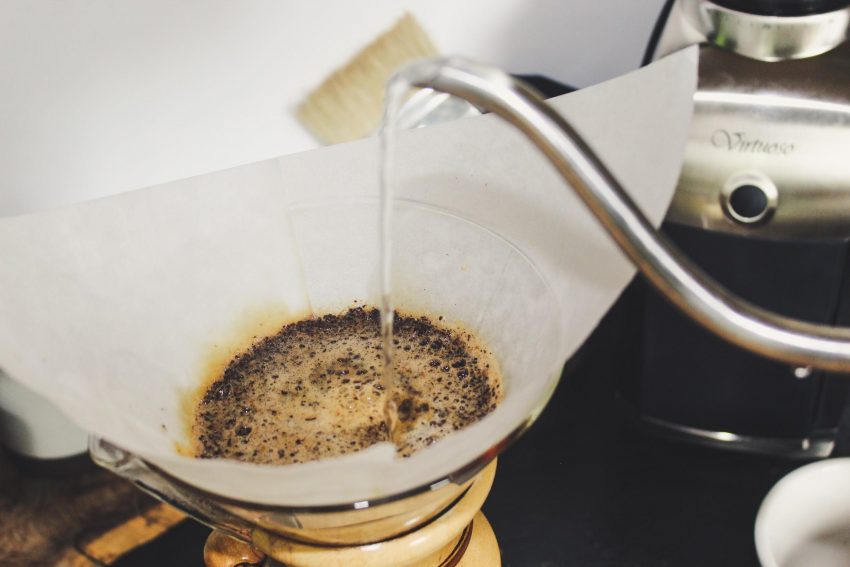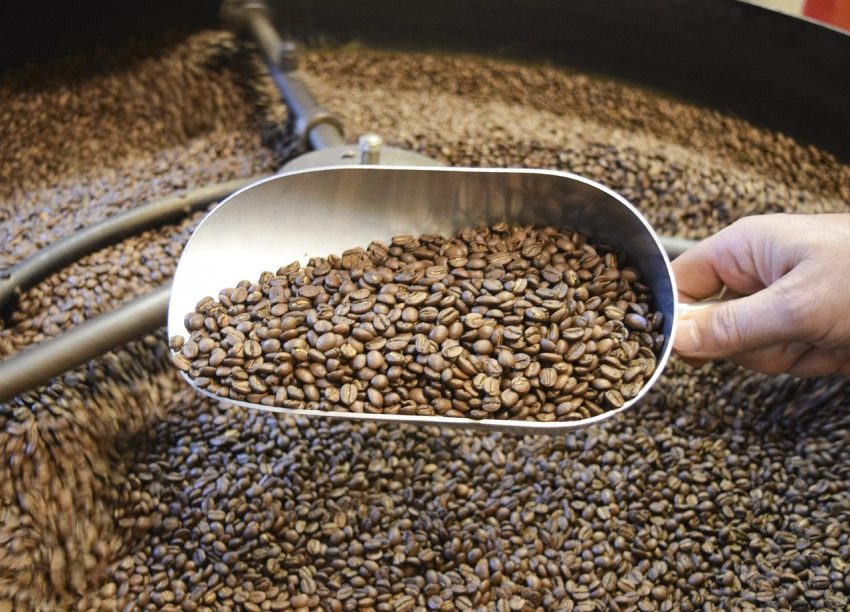The secret of the coffee bean season-what do you want to raise coffee beans? How do you raise it? For how long?
Professional coffee knowledge exchange more coffee bean information please follow the coffee workshop (Wechat official account cafe_style)
Can I drink the coffee beans as soon as they are roasted? Or how to grow coffee beans? How long will it take to keep it?
Under the promotion of the boutique coffee market, in fact, many coffee lovers, including newcomers, have been popularized by science, and coffee beans need to be nurtured before they taste good. But why raise it? How do you raise it? For how long?

Before answering the above questions, let's talk about some knowledge of coffee roasting.
In fact, the scientific community has never stopped discussing the chemical substances of raw and cooked beans, and even after such a long and costly research, the scientific community still has a lot of question marks over many details. According to current projections, we can find at least a thousand different aromas in roasted coffee beans. Unfortunately, we still don't know the exact number or even what the components are. Today, more than 200 substances are unknown.

Each coffee bean contains about 200000 individual cells, each of which operates like a tiny pressure vessel, like a small reaction device. In the early stage of roasting, the moisture in the raw beans dissipates quickly, and the living water in the coffee begins to evaporate. With the increase of the temperature of coffee beans, the evaporation of water will put pressure on the cell wall. in this process, the element of water is the protagonist, and there are a series of interesting physical and chemical reactions with the oil in coffee (so complex that science students want to hit the wall). As the pressure increases, the cell wall begins to expand, and the evaporation of water makes the cell wall slowly harden. As the roasting process continues down, the pressure inside the beans increases, and the coffee oil is brought into the tiny pores in the cell wall, creating a sealing effect that retains carbon dioxide, other aromas and coffee aromas.
What is raising beans (awakening beans, ripe)?
Coffee beans are like living personnel. the oxidation of cells caused by oxygen inhalation is also a process of aging. Freshly roasted coffee is still too young to reach the most mature stage, just like human beans. it takes years to grow up to make you more mature, and what you need is to give the coffee beans some time. To put it bluntly, bean cultivation is the process of "gas release", which is also commonly known as awakening, raising beans or ripening.
About 2% of the weight of coffee beans that have just been roasted by fire is carbon dioxide, and this large amount of carbon dioxide emits carbon dioxide with the storage environment, equipment, or method, making the pressure in the package higher than an atmospheric pressure. the pressure helps to integrate aromatic substances with oils, making all the aromatic substances inside the coffee beans easy to extract.

The common one-way exhaust valve for coffee bean bags on the market is to discharge excess carbon dioxide so as to prevent the bean bag from being broken by carbon dioxide.
What does this have to do with packing? This important question requires a glimpse into the mysteries of the cell wall structure in coffee beans. The cell walls in coffee beans are only about 5 microns thick, but they can withstand the pressure of 140psi (pounds per square inch), which mainly comes from carbon dioxide produced during the second half of the baking process. Finally, a few days after the baking cycle, the so-called gas release process begins, and carbon dioxide begins to dissipate from the coffee beans.
The complete exhaust process of coffee beans must be much longer than that of coffee powder after grinding, and the exhaust phenomenon of coffee beans will also shorten the life of coffee beans. In the early exhaust process, the air will replace the escaped carbon dioxide with a proportion of about 1:1, and the air contains about 21% oxygen, so the air absorption will quickly oxidize the coffee, the coffee will continue to exhaust, and the pressure inside the coffee beans will low. the rate of exhaust will begin to slow down. Over time, 12-ounce bags of baked beans release more than half a cubic foot of carbon dioxide.
Why bother to raise? What is the effect of raising coffee beans on the taste?
The flavor composition of roasted coffee beans has been roughly determined, and many people blame the coffee beans for the change in flavor from day to day, but as mentioned before, everything will deteriorate slightly after oxidation, affecting the taste. It may not have such a fine taste on the apple, but the coffee will obviously feel the change in taste.
Experiments have shown that the taste of coffee beans changes more in the first five days than in the next five days, mainly because exhaust is the most active during the first five days of baking. The freshly roasted coffee beans release a large amount of aroma factors and carbon dioxide, which are released through small holes through the roasted coffee beans, which are released during grinding, while in the process of cooking, the contact between the powder and water is isolated, resulting in insufficient extraction (especially the high-pressure rapid extraction of Espresso), while time pushes back when the layer of carbon dioxide becomes thinner and the contact area increases. Coffee is also becoming more and more flavorful, so the coffee bean cultivation period is not really "raising" coffee beans, but a process of deflation and exhaust.
So, how to raise beans?
How to raise beans: put the unopened coffee beans in a cool, dry, light-proof environment without irritating odor. Stick the one-way exhaust valve after the bean cultivation period (with transparent glue).
According to most experts, it is best to wait more than 6 hours for coffee extracted without pressure apparatus (such as hand-brewed coffee) (8-12 hours for cup test) and more than 5 days for Espresso coffee.
The exhaust effect of coffee beans does not begin until 3 hours after baking, and the coffee beans do not release any carbon dioxide, and the taste after cooking is very unstable. If you have ever washed hot water into freshly roasted fresh coffee powder, or use it to make a cup of Espresso, you will find it very sharp and irritating in taste, bitterness of over-extraction and obvious acidity. It will be difficult for you to associate it with the smooth and sweet taste.
So keep in mind that in any case, time is absolutely necessary for coffee to release carbon dioxide and stabilize its taste.
If all the carbon dioxide is missing, won't it smell good?
Don't forget that the aroma factors are constantly losing over time. By that time, the coffee brewed by the stew may only have a bitter taste, and all the sour and sweet that you should have have been released by you. According to the baking degree or the roaster's advice, raising beans is a better choice. In addition, it is also recommended to shake so that the coffee beans below can also be breathable at the top.
In the best flavor period, it may cause coffee beans to produce oil, which is in fact normal, but it is also a small warning that the flavor of coffee beans is about to go downhill, reminding you that you need to finish cooking as soon as possible. so that delicious coffee beans won't be wasted!
How long will it take to keep it? How to distinguish according to the degree of baking?
In fact, there is no specific schedule for raising beans, only according to experience or advice given by the baker. Generally speaking, the deeper the degree of roasting, the more exuberant the exhaust effect, and the looser the coffee beans, the faster the carbon dioxide will be released.
Coffee beans extracted under atmospheric pressure: it is recommended to raise beans in 14 days for very shallow roasting, 10 days for light roasting, 7 days for medium roasting, and 4 to 5 days for medium and deep roasting.
Espresso beans: espresso beans are generally roasted to medium-deep baking, so you need to raise beans for at least 5 days. About 15 days after baking, the aromatic substances in the oil will be more stable, the aroma and body of the brewed coffee will increase, and the stability will be higher. However, commercial coffee beans usually do not have so much time to raise, so they will speed up the awakening of coffee beans under exposure to air, so that coffee beans can reach the palatable stage as soon as possible.
The deeper the baking degree, the more obvious (faster) the exhaust effect, and the faster the exhaust reaches the ripening stage. The shallower the degree of baking, the less obvious (slower) the exhaust effect, and the longer it takes to mature.
The baking method, technology or baking degree of each bean is slightly different (for example, beans from a hot air roaster usually enter the best flavor period earlier), so there is no standard time for raising beans, depending on the user's understanding of the beans.
How to make the best coffee in different bean cultivation periods?
In order to introduce the best flavor of coffee beans, it is necessary to correct and confirm the coffee grinding thickness and adjust the amount of powder used. The longer the beans are kept, the more holes there will be, and when you grind these coffee beans, they will be more easily broken. At the same time, the exhaust reaction will be weakened, making it easier for water to come into contact with coffee powder to extract, and hot water can dissolve substances more easily.
Therefore, in general, the longer the beans are stored, the more careful you are with excessive extraction-you can try to lower the water temperature / adjust the degree of grinding / reduce the extraction time / reduce stirring, which has achieved the goal of balanced extraction.
Important Notice :
前街咖啡 FrontStreet Coffee has moved to new addredd:
FrontStreet Coffee Address: 315,Donghua East Road,GuangZhou
Tel:020 38364473
- Prev

What are the five techniques of hand-brewing coffee? Do you need a coffee hand fight for hand flushing?
Professional coffee knowledge exchange more information about coffee beans Please follow Miss Coffee Workshop (official Wechat account cafe_style). Can I help you grind the coffee beans into powder? Yes, it's too troublesome to grind yourself at home. This kind of conversation occurs many times in major coffee shops every day. After watching today's push, don't let the store grind the coffee powder for you again! We know someone who doesn't buy it.
- Next

The best time to enjoy coffee? How long is the coffee expiration date? Can I still drink coffee after it has been kept for a long time?
Professional coffee knowledge exchange more coffee bean information Please pay attention to coffee workshop (Wechat official account cafe_style) Coffee is a decreasing substance, which is degraded and reorganized during roasting to exhaust after baking. Coffee beans oxidize with time and contact with air, and their flavor and quality deteriorate slowly, locking up the volatilization in the coffee fiber tissue.
Related
- Beginners will see the "Coffee pull flower" guide!
- What is the difference between ice blog purified milk and ordinary milk coffee?
- Why is the Philippines the largest producer of crops in Liberia?
- For coffee extraction, should the fine powder be retained?
- How does extracted espresso fill pressed powder? How much strength does it take to press the powder?
- How to make jasmine cold extract coffee? Is the jasmine + latte good?
- Will this little toy really make the coffee taste better? How does Lily Drip affect coffee extraction?
- Will the action of slapping the filter cup also affect coffee extraction?
- What's the difference between powder-to-water ratio and powder-to-liquid ratio?
- What is the Ethiopian local species? What does it have to do with Heirloom native species?

